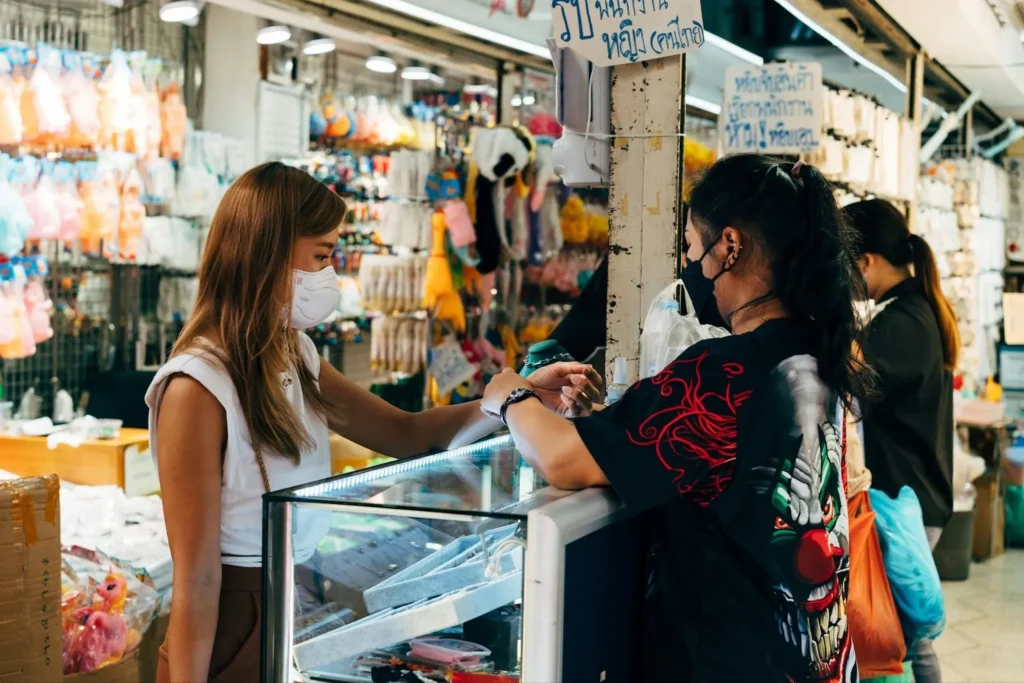
Key Highlights:
- Greetings and politeness are fundamental in Thai culture, exemplified by the use of phrases like “สวัสดีครับ/ค่ะ” (sà-wàt-dee khráp/khâ) for respectful interactions.
- The intricate relationship between language and Thai cultural values is uniquely highlighted, where even simple phrases carry deep significance regarding respect and formality.
- Mastery of basic Thai phrases offers digital nomads the chance to significantly enrich their cultural immersion and interactions within local communities.
- The phrases covered to aid in basic communication and embody respect for cultural etiquette, which is crucial for building rapport with locals.
- Knowing these vital Thai phrases is more than a linguistic necessity—it’s a bridge to deeper cultural understanding and a more rewarding experience in Thailand.
Hello, fellow travelers and digital nomads!
I’m Joy Intisuk, a linguist and digital nomad born and raised in the Land of Smiles, Thailand.
Through my journey as a digital nomad, I’ve learned that having a grip on some basic local phrases isn’t just a tool—it’s a bridge to deeply connect with the culture and people in every country I’ve been to.
In this post, I want to share the top five Thai phrases that are indispensable in my daily life here. This practical, concise guide to essential Thai phrases can help nomads like you in their daily communication.
Whether you’re here for a month or planning to stay indefinitely, these phrases will help you navigate your new surroundings more easily.
Phrase 1: “สวัสดีครับ/ค่ะ” (sà-wàt-dee khráp/khâ) – Greetings and Basic Politeness

Understanding the Phrase
The phrase consists of the word “สวัสดี” (sà-wàt-dee), meaning “hello” or “goodbye,” followed by a polite particle.
Male speakers use the particle “ครับ” (khráp), and female speakers use “ค่ะ” (khâ).
These particles are crucial as they convey respect and formality, which are highly valued in Thai culture.
Usage in Social Interactions
In Thai culture, a greeting is more than just a way to say hello; it’s a sign of courtesy and camaraderie. The significance of gender roles and politeness in Thai society is highlighted using the appropriate, respectful particle based on the speaker’s gender.
When used correctly, this term can significantly impact a digital nomad’s daily encounters. It is a simple yet effective technique for demonstrating cultural awareness, which promotes more considerate and meaningful cultural interactions with the locals.
Personal Anecdote
When I first began my journey as a digital nomad in Bangkok, I quickly learned the power held by the simple greeting, “สวัสดีค่ะ” (sà-wàt-dee khâ).
Having grown up in Chiang Mai, I was familiar with the respectful nuances of Thai greetings, but it was during these early days in the capital that I truly understood their impact.
I remember walking into a small, locally-owned coffee shop near one of the city’s coworking spaces. With a smile, I greeted the owner with “สวัสดีครับ” (sà-wàt-dee khráp), mindful of using the polite particle as a gesture of respect.
A warm smile lit up the owner’s face, and that’s when this coffee shop became more than simply a coffee place; it became a venue where I connected with the local community.
We often talked about the complexities of Thai society and shared travelogues, which led to introductions to other locals and insights into the city’s best-kept wonders.
This encounter was enlightening; it was not just about saying the appropriate words but also about conveying respect and a genuine desire to fit in with the community.
This simple gesture eventually led to many opportunities, making my digital nomad experience richer and more fulfilling.
It reinforced my belief that understanding and respecting local etiquette is beneficial and essential for anyone looking to truly experience the depth of Thai culture.
Phrase 2: “ขอบคุณครับ/ค่ะ” (khàawp-khun khráp/khâ) – Thanking and Showing Appreciation

Cultural Significance of Gratitude
In Thai culture, expressing gratitude is not just a polite formality but a profound expression of respect and appreciation. Thais value humility and graciousness, and this phrase embodies both qualities.
Again, the use of the polite particles “ครับ” (khráp) for men and “ค่ะ” (khâ) for women further enhances the respectfulness of the phrase, reinforcing gender roles and polite social behavior in Thai society.
Usage and Social Implications
Everyday Use
The phrase “ขอบคุณครับ/ค่ะ/” (khàawp-khun khráp/khâ) is ubiquitously used in scenarios ranging from receiving services at a restaurant or store to accepting help or a gift.
It acknowledges the other person’s effort and affirms their actions, which is highly appreciated in Thai society.
Building Relationships
Social interactions can be significantly impacted by the regular use of this phrase. It facilitates the development of ties based on mutual respect and understanding.
Since digital nomads are frequently viewed as outsiders, genuinely utilizing these words can make the local community more accepting of us.
Enhancing Interactions
The genuineness of your thank yous can affect how people interact with you. Sincere gratitude is often reciprocated with a smile and an eagerness to engage more with Thai people, creating a positive cycle of goodwill.
Better service, insightful knowledge of regional cultures, or even friendships may result from this simple gesture.
Practical Examples and Insights
For instance, a digital nomad might use this phrase when a local shopkeeper tries to find a particular item.
By saying “ขอบคุณค่ะ” (khàawp-khun khráp/khâ) with genuine appreciation, the nomad acknowledges the shopkeeper’s extra effort, which not only pleases the shopkeeper but often leads to a more helpful and friendly relationship.
Similarly, in professional settings like coworking spaces, using this phrase when colleagues assist with tasks or provide local advice can strengthen professional and social ties.
Broader Impact
Understanding and effectively using “ขอบคุณครับ/ค่ะ/” (khàawp-khun khráp/khâ) is more than knowing local language etiquette; it’s about embracing Thailand’s key cultural value: gratitude.
For a digital nomad like me, who navigates both the role of a cultural ambassador and a community leader, promoting this phrase among my fellow digital nomads helps them integrate more seamlessly into Thai society.
It is a simple yet powerful tool that enhances their cultural experience and facilitates more profound connections with the Thai people.
Phrase 3: “เผ็ดไหม” (pèt măi?) – Is it spicy? – Dining and Food

Cultural Relevance of Spiciness in Thai Cuisine
Thai food is renowned for its intricate flavor combinations, blending bitter, salty, sweet, sour, and spicy elements in one dish.
Spiciness, in particular, is a hallmark of many Thai dishes, derived from the liberal use of ingredients like chili peppers, garlic, and ginger.
The question “เผ็ดไหม?” (pèt măi?) becomes crucial as it directly addresses the spice component, allowing individuals to navigate their meals according to personal taste and spice tolerance.
Practical Usage in Dining Scenarios
Restaurant Interactions
When ordering food from a restaurant or on the street, it’s essential to know when to ask if it’s spicy.
Doing so helps avoid situations where the food is excessively spicy for your taste, which can lead to physical discomfort and ruin the meal experience.
Customizing Food Orders
Customers can ask for the degree of spiciness to be adjusted by inquiring about how spicy a dish is. This statement is helpful for customizing meal orders according to your tolerance.
Don’t worry; most Thai chefs are used to modifying the dish’s spiciness based on customer preferences.
Ultimately, all they want is for their food to be enjoyed. And if that means toning it down a bit, then that’s no biggie!
Dietary Considerations and Health Implications
Health Impacts
For those with sensitive stomachs (ehem, like me) or certain medical issues, knowing how to inquire about and control the quantity of spiciness in food is imperative.
It ensures you can savor Thai culinary culture’s richness without suffering health consequences.
Cultural Insight and Respect
Asking about spice levels can signify respect for and interest in the cuisine.
Thai chefs and servers generally find it admirable when diners are interested in learning more about the food they are serving.
Broader Implications for Social and Cultural Integration
Enhancing Cultural Experiences
Understanding local food practices is part of the cultural immersion process for digital nomads and travelers.
By effectively using “เผ็ดไหม?” (pèt măi?), they demonstrate a willingness to engage with and adapt to local customs, which can enrich their overall experience in Thailand.
Building Connections Through Food
Food is a universal language that cultivates connections and dialogue.
Asking about food preferences, like spice levels, can lead to recommendations from locals, shared meals, and deeper discussions about Thai food culture and its regional variations.
Phrase 4: “ราคาเท่าไหร่ครับ/ค่ะ” (raa-khaa thâo-rài khráp/khâ) – How much is this? – Asking for Prices

Cultural Context of Haggling
In Thailand, bargaining is not just a way to get a better price but also a form of social interaction.
The markets are lively places where negotiation is expected and considered part of the shopping experience.
Using the phrase “ราคาเท่าไหร่ครับ/ค่ะ” (raa-khaa thâo-rài khráp/khâ) effectively sets the stage for negotiation, showing that you are familiar with local customs and respectful of the traditional market dynamics.
Enhancing Shopping Experiences
Initiating Conversations
This phrase is typically the starting point for any transaction in Thai markets. It opens a dialogue between the buyer and the seller, serves as an icebreaker, and often leads to further interactions.
Gauging Price Fairness
Understanding the local pricing standards is crucial for tourists and expatriates. This phrase will help you gauge whether products are offered at tourist or local prices, allowing for more informed decisions.
Yes, some market sellers will attempt to take advantage of foreigners and charge a steeper price than they usually would to locals. So, heads up!
Facilitating Better Deals
By asking the price in Thai, shoppers may signal to vendors that they are not typical tourists and may be more familiar with the local pricing. This can sometimes lead to more reasonable initial pricing and better deals through bargaining.
So, don’t be shy to haggle, as long as it’s also a FAIR price.
Being unreasonably cheap can offend merchants, too.
Building Relationships with Vendors
Cultural Respect
Using the local language to inquire about prices shows respect for the culture and the vendor. This respect can make vendors more receptive and friendly, enhancing the overall shopping experience.
Fostering Connections
Regular interactions using this phrase can help build rapport with local vendors, especially for those living in Thailand long-term, like digital nomads.
Over time, this rapport can lead to benefits such as discounts, recommendations, and insights into the best local products.
Practical Applications
Market Shopping
When exploring local markets, using “ราคาเท่าไหร่ครับ/ค่ะ/” (raa-khaa thâo-rài khráp/khâ) not only helps you get a fair price but also enriches the cultural experience, as markets are a central part of Thai life.
Everyday Purchases
Knowing how to ask for the price in Thai streamlines transactions and aids in budget management when buying everyday items at small shops or street stalls.
Phrase 5: “ช่วยด้วยครับ/ค่ะ” (chûay duay khráp/khâ) – Please help me. Requesting Help or Directions

Cultural Considerations of Requesting Help
In Thai culture, politeness and the concept of maintaining one’s own dignity and that of others in social interactions are paramount.
Requesting help using “ช่วยด้วยครับ/ค่ะ” (chûay duay khráp/khâ) is not only a demonstration of linguistic courtesy but also an expression of respect towards the person being asked for help.
Again, by adding the polite particles “ครับ” (khráp) for men and “ค่ะ” (khâ) for women, the speaker shows deference, which is highly valued in Thai social norms.
Enhancing Effective Communication
Elicitating Positive Responses
Thais are generally known for their friendliness and willingness to help.
Using the phrase appropriately shows that the requesting party is making an effort to communicate in the local language, which can lead to more empathetic and helpful responses.
Use in Emergencies
This phrase can be a lifeline in urgent situations, such as getting lost or needing immediate assistance.
It clearly communicates the need for help, making it easier for locals to understand the urgency and respond accordingly.
Trust me, you SERIOUSLY need to learn this phrase to get you through a crisis faster and more effectively.
For instance, in medical emergencies, where time is of the essence to your survival, you do not have time to explain and translate everything.
But uttering “ช่วยด้วยครับ/ค่ะ” (chûay duay khráp/khâ) instantly conveys your dire need for help.
Building Connections
Social Interaction
When used appropriately, this phrase can lead to meaningful interactions with locals.
It can open up conversations, and through these interactions, visitors or expatriates can gain deeper insights into Thai culture and community life.
Vulnerability and Trust
Expressing vulnerability by asking for help can also foster a sense of trust.
Locals who see that a foreigner relies on them for assistance are often more willing to engage, share their knowledge, and offer support, thereby strengthening community bonds.
Practical Scenarios
Navigational Help
For digital nomads and travelers exploring off-the-beaten-path locations or even bustling city streets, using this phrase to ask for directions can simplify navigation.
Technical Assistance
This phrase can be instrumental in getting the necessary support in situations where one might struggle with technology, Wi-Fi connection (every digital nomad’s nightmare), or local services, such as using public transportation systems or understanding service at a bank.
Final Thoughts: Essential Thai Phrases for Digital Nomads
As we wrap up this engaging exploration into “The Top 5 Thai Phrases Every Digital Nomad Should Know,” we hope you have found these basic terms enlightening and valuable.
Let this article be your practical, concise guide to essential Thai phrases that can significantly aid digital nomads in their daily communications.
Whether greeting someone with “สวัสดีครับ/ค่ะ/,” expressing gratitude through “ขอบคุณครับ/ค่ะ/,” inquiring about the spice level of your meal with “เผ็ดไหม?”, asking for prices with “ราคาเท่าไหร่ครับ/ค่ะ/,” or seeking help with “ช่วยด้วยครับ/ค่ะ/,” these phrases are more than mere tools of communication. They are gestures of respect and an acknowledgment of Thai customs and values.
This collection serves as a linguistic toolkit for digital nomads and a cultural compass, guiding interactions in a way that is considerate and cognizant of local etiquette.
So, as you continue your adventure in Thailand or plan your next move, keep these phrases close to your heart.
They will ease your daily interactions and enhance your understanding of a fascinating culture, making every moment of your nomadic life richer and more engaging.
Safe travels and happy learning!
FAQs:
What is the significance of using polite particles in Thai phrases?
Polite particles like ครับ (khráp) and ค่ะ (khâ) are crucial as they convey respect and formality, which are highly valued in Thai culture.
Can you provide an example of how to greet someone in Thai?
To greet someone in Thai, say “สวัสดีครับ” (sà-wàt-dee khráp) if you are male and “สวัสดีค่ะ” (sà-wàt-dee khâ) if you are female.
What should digital nomads know about asking for food preferences in Thailand?
Digital nomads should be prepared to ask, “เผ็ดไหม?” (pèt măi?) to determine if a dish is spicy, which can be crucial for those with specific dietary needs or preferences.
Why is expressing gratitude important in Thai culture?
Expressing gratitude through phrases like “ขอบคุณครับ/ค่ะ” is not just a polite formality but a profound way to show respect and appreciation, which is deeply valued in Thai culture.
How should digital nomads use the phrase to ask for help in an emergency?
In emergencies, digital nomads can use “ช่วยด้วยครับ/ค่ะ” (chûay duay khráp/khâ) to quickly indicate their need for assistance, facilitating faster and more effective help.